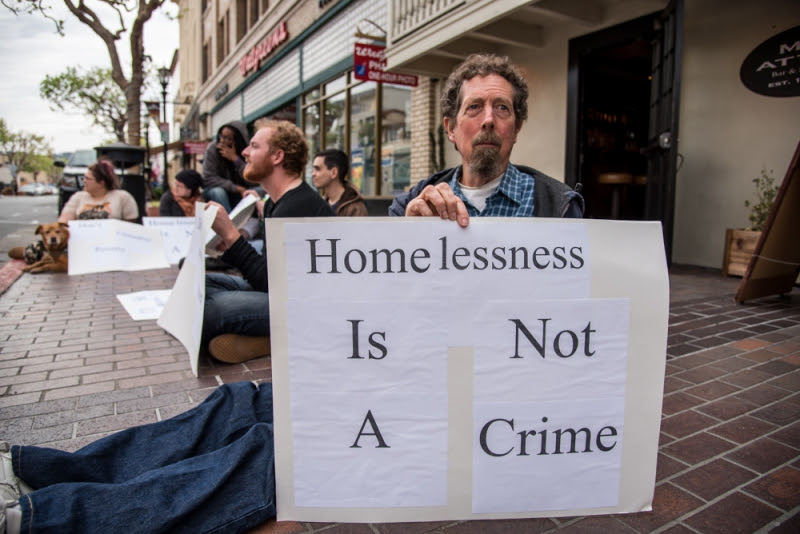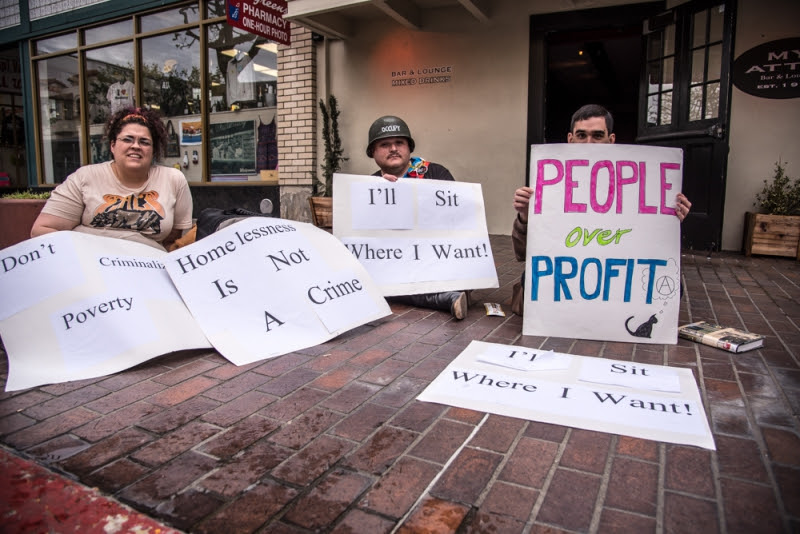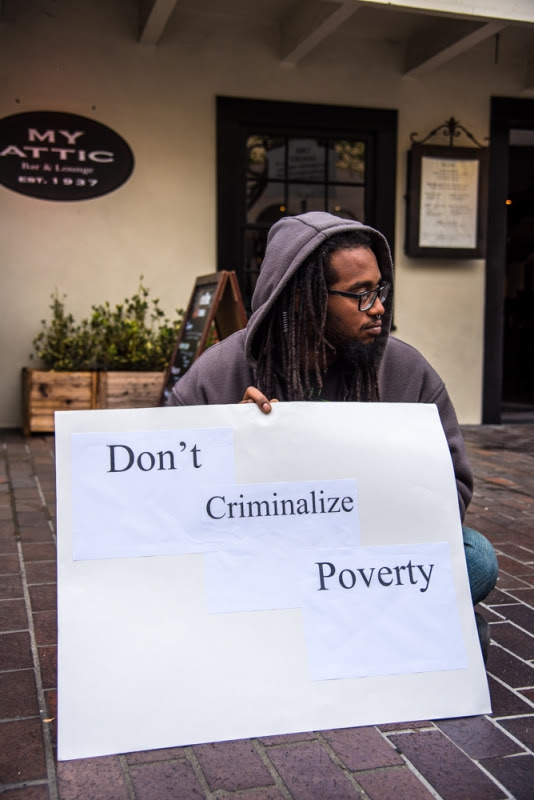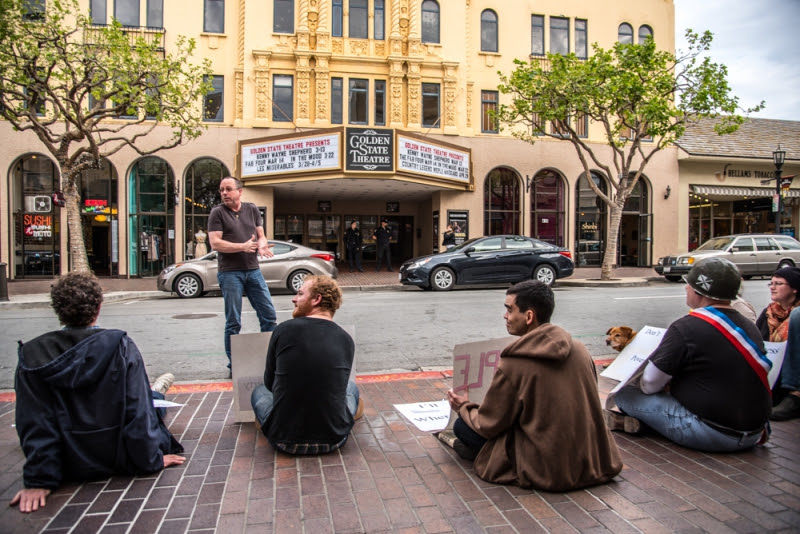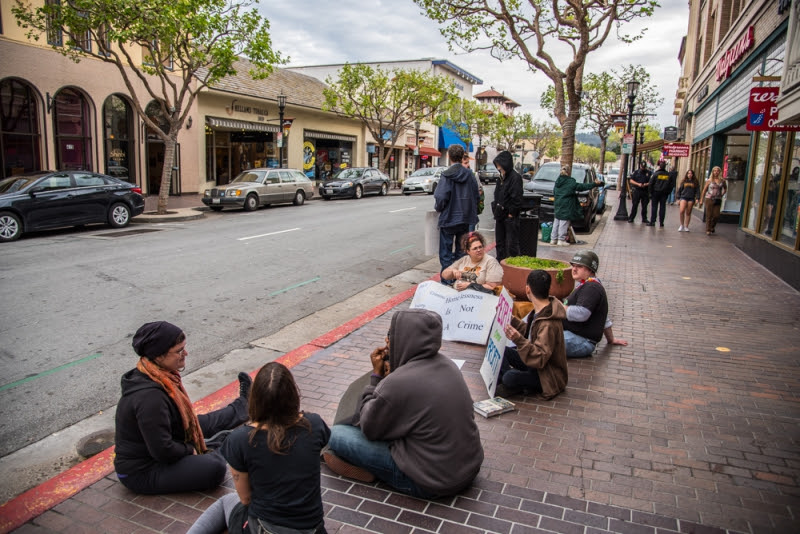Note by Norse: Berkeley has long held off the worst anti-homeless ordinances. Far worse laws are entrenched in Santa Cruz since 1994 and have gotten exponentially worse.
Our latest obscenity is the Stay-Away-at-a-Policeman’s-Whim law which allows cops and rangers to issue their own stay-away laws once they’ve given out any kind of infraction ticket with no judicial oversight. Already hundreds of such orders have been issued (on pain of a year in jail) and as of mid-February the length of banishment has been increased for up to a year.
Santa Cruz’s laws on sitting and panhandling are harsher by an order of magnitude at least than Berkeley’s current and proposed laws. Our laws ban sitting on 99% of the sidewalks in business and beachfront districts and ban all panhandling at night, even if peaceful and only involving a silent sign. MC 13.08.090(b) banning “disorderly conduct on park property” makes it a misdemeanor to “by threatening or abusive or profane language, willfully molest or unreasonably interfere with the use of a city park or bench by any other person.”
Why such a discrepancy between Berkeley and Santa Cruz? Both are university towns with liberal reputations,. Berkeley is bigger and lies in a larger urban area where activists can more easily congregate to oppose the reactionary riptide. Berkeley also seems to be able to enlist–at least in part–many social workers and service providers, who remain starkly silent in Santa Cruz as nasty law after law is proposed and passed.
Activists in Berkeley hit the streets and demand real local police reform instead of largely limiting their concerns to symbolic targets like the BearCat armored personnel carrier, license recognition software, or “protection” from the NDAA. The most recent liberal coalition of organizations appearing faithfully at City Council to speak out against the BearCat have banned HUFF from their literature in a closed meeting without discussion, appeal, or notice.
Those interested in a possible caravan up to Berkeley on Tuesday March 17th, contact HUFF at 423-HUFF (4833). I hope to be heading that way with at least one vehicle. I’ll be hoping to interview someone from Berkeley on this issue tomorrow on Free Radio Santa Cruz at www.freakradio.org sometime between 9:30 AM and 1 PM.
Check the links in the three stories below to catch more photos, comments, and video.
Osha Neumann Thursday March 12, 2015 – 10:07:00 PM
http://www.berkeleydailyplanet.com/issue/2015-03-13/article/43102?headline=Rally-and-March-Planned-to-Protest-Effort-to-Pass-New-Anti-Homeless-Laws-in-Berkeley–Osha-Neumann
The Streets Are for Everyone Coalition (SAFE), is calling for an emergency march and rally on March 17 to protest efforts to get the Berkeley City Council to pass new laws targeting homeless people on the streets of the city.
The protest will precede a meeting of the Council at which it will consider a proposal by Councilmember Linda Maio for a raft of new ordinances, which would criminalize such innocuous activities as “lying on planter walls” and “deployment” of bedding on sidewalks and plazas during the day.
“Taken together with existing laws, these ordinances would essentially make it illegal for people who are homeless to have a presence on our streets and sidewalks,” said Osha Neumann an attorney with the East Bay Community Law Center. He has represented many homeless people who have received citations for, he says, “activities they engage in as part of their effort to survive.”
Professor Jeff Selbin is the director of Berkeley Law’s Policy Advocacy Clinic, which recently published a study about the growing enactment and enforcement of anti-homeless laws in California. He commented: “The evidence from around the state and country is quite clear: criminalizing people who are homeless doesn’t solve any of the underlying causes or conditions of homelessness; in fact, it only makes them worse. It would be inhumane, ineffective and expensive for Berkeley to double down on punitive laws that will only hurt our most vulnerable residents.”
Patricia Wall, Executive Director of the Homeless Action Center, expressed outrage that it was again necessary to fight for the rights of people who are homeless in the town with a supposed commitment to civil liberties. “Just under 2 ½ years ago,” she said, “Berkeley voters defeated Measure S, which would have criminalized sitting on the sidewalk. The same real estate interests that brought us that proposal are back again. And once again we need to show them that they don’t own this town, nor, hopefully, its politicians.”
Bob Offer-Westort of the San Francisco Coalition on Homelessness and former head of the “No on S. Campaign,” was astounded when he learned of Maio’s proposals. “Berkeley’s continuing failure to pay any heed to reason, research, or fellow feeling when developing homeless policy is mind-numbing. This city has a homeless commission, a homeless task force, and one of the best schools of social work in California. But our legislators can’t be bothered to lend an ear to either homeless people themselves, service providers, or policy experts, but legislation seems to be driven by a relentless cycle of panic and whim.”
The march will begin at 5 PM on the corner of Telegraph Ave. and Haste Street and proceed to the steps of Old City Hall at 2134 Martin Luther King Jr. Way, for a rally at 6 PM.
Streets Are For Everyone Coalition (SAFE) : safecoalitionberkeley@gmail.com
Homeless advocates plan march and rally to protest proposals to regulate conduct on Berkeley streets
By Tom Lochner tlochner@bayareanewsgroup.com
http://www.montereyherald.com/general-news/20150313/homeless-advocates-plan-march-and-rally-to-protest-proposals-to-regulate-conduct-on-berkeley-streets
Posted: 03/13/15, 5:03 PM PDT |
BERKELEY — Advocates for the homeless are protesting a new set of rules, proposed by Councilwoman Linda Maio, that they say would criminalize much of what homeless people do to survive.
Maio, whose northwest Berkeley district includes the commercially booming Gilman Street corridor, proposes several ordinances to regulate a slew of activities in commercial areas, ranging from cooking, panhandling and storing possessions, to urinating and defecating.
“Taken together with existing laws, these ordinances would essentially make it illegal for people who are homeless to have a presence on our streets and sidewalks,” Osha Neumann, an attorney with the East Bay Community Law Center, said in a news release from the SAFE (Streets Are For Everyone) coalition.
The group has called a protest march and rally before Tuesday’s City Council meeting.
Maio says her proposals “will go a long way to establishing clarity for law enforcement and ensuring that the entire public has access to the public streets and plazas unimpeded.”
Measures include:
UC Berkeley professor Jeff Selbin is cited in the SAFE news release as saying evidence from around the state and nation clearly shows that “criminalizing people who are homeless doesn’t solve any of the underlying causes and conditions of homelessness; in fact, it only makes them worse.”
Maio says she seeks “consistency in the enforcement of current ordinances,” to protect public infrastructure, facilitate maintenance, promote cleanliness and safeguard public access, among other goals.
She also wants a review of ordinances in other cities that address public urination and defecation and to ensure that public restrooms are available and well publicized, in collaboration with BART.
She also wants to survey business districts about the adequacy of enforcement of current ordinances; study whether
a six-foot right of way is adequate for pedestrian and wheelchair passage in high-traffic areas; and explore extending transition-aged youth shelter hours beyond winter months.
The regular council meeting will begin at 7 p.m. in the Old City Hall at 2134 Martin Luther King Jr. Way.
The march will begin at 5 p.m. at Telegraph Avenue and Haste Street and will proceed to Old City Hall for a rally at 6 p.m., according to the SAFE news release.
Contact Tom Lochner at 510-262-2760.
Carol Denney
Friday March 13, 2015 – 12:17:00 PM
http://www.berkeleydailyplanet.com/issue/2015-03-13/article/43106?headline=Why-Criminalizing-Poverty-Sells–Carol-Denney
Criminalizing homelessness is the most expensive, least effective way to address homelessness. Studies prove it, reporters note it, and common sense suggests it since paying for a year of low-income housing or even a college education costs a lot less than a year in jail. So why does it sell like crazy?
Nationwide we’re bristling with new anti-homeless and vagrancy laws according to a report by the National Law Center on Homelessness & Poverty. California leads with way with an average nine such laws per city according to the UC Berkeley School of Law Policy Advocacy Clinic’s recent study. The laws typically criminalize standing, sitting, lying down, sleeping, having belongings with you which might define you as “camping”, sleeping in your own car, sharing food with others, asking for money or help from others, and other behaviors which are unavoidable, especially for people who have no place
to go.
Why are these embarrassingly heartless laws so easy to pass and so popular? The answer is that there’s currently a political cost to any politician who insists on the creation of low-cost housing as a priority. But there is very little political cost at present to passing yet another law, even an unconstitutional law, which burdens the poor.
Berkeley is a great example. Berkeley is a college town, notoriously liberal, consistently cast as comically out of touch with mainstream American politics in national press. But successive mayor after mayor has been more than willing to override community will, ignore the moral objections of religious and human rights groups, and go to bat in court for unconstitutional legislation on behalf of political groups who want the poor to just disappear.
In an interview with Berkeley author John Curl, Mayor Tom Bates referred to rent control in particular as “a no-win position” for him and “a death knell” for politicians generally. Berkeley citizens, in the absence of honest leadership on the issue of low-income and affordable housing, cite their own frustration with panhandling and homelessness as reason enough to vote repeatedly for laws of dubious constitutionality which target poor people on the street struggling with unemployment, evictions, and skyrocketing rents.
U.S. District Court Judge Claudia Wilken issued a temporary restraining order in 1995 against Berkeley’s 1994 anti-panhandling law, noting that “some Berkeley citizens feel annoyed or guilty when faced with an indigent beggar . . . Feelings of annoyance or guilt, however, cannot outweigh the exercise of First Amendment rights.”
Poor and homeless people are notoriously ill-equipped to hire lawyers and mount legal challenges to the anti-poor laws generated primarily by merchant associations which, in the case of the powerful Downtown Berkeley Association (DBA), get mandated “membership” payments from all the businesses within its expanding downtown footprint. The DBA’s board is dominated by large property owners who were the primary funders of the failed anti-sitting law campaign in Berkeley’s 2012 election. There is not a single representative on the board from the poorly funded non-profits and law clinics who work with the poor and homeless people caught up in the endless web of the criminalization of poverty. Those are the groups who will show up in opposition to new anti-homeless initiatives. But they are much less likely to be as able as wealthy investment and property companies to toss large campaign donations the council’s way come the next election.
The Berkeley City Council knows that circling poor and homeless people endlessly through overburdened courts and jails over unpayable fines for innocuous offenses is dumb. They tend to be intelligent people who by now have had somebody toss a copy of Berkeley Law’s Policy Advocacy Clinic’s report on California’s New Vagrancy Laws or the No Safe Place report on the Criminalization of Homelessness in U.S. Cities from the National Law Center on Homelessness and Poverty (or both) on their desks. They may even have read the reports.
But it takes courage to say no to merchant associations’ and the University of California’s short-sighted effort to make homelessness and poverty invisible. Courage is in short supply in the Berkeley City Council chambers. For all the opining in January and February 2015 about the Black Lives Matter campaigns, and even though the majority of those affected are people of color and people struggling with disabilities, the anti-homeless laws slated for passage at the March 17th Berkeley City Council meeting seem to be proof that the war on the poor will go on without interruption.
Public Comment
On
March 17th the Berkeley City Council will consider expanding the authority and practice of police, especially in downtown Berkeley. The council will consider authorizing the police to treat the down and out even more harshly than they are already treated.
Jesse Arreguin and Linda Maio have brought this authoritarian measure before council.
Here is one good description of the proposals, via Copwatch:
“1. Ordinance preventing panhandling within 10 feet of a parking pay station (akin to our ATM ordinance).
“2. Review ordinances other cities use to address public urination/defecation and return with recommendations for implementation; ensure public restrooms are available and well publicized. Involve BART in exploring possible locations.
“3. Ordinance preventing the placement of personal objects in planters, tree wells, or within 3 feet of a tree well.
“4. Ordinance preventing lying on planter walls or inside of planters.
“5. Ordinance preventing deployment of bedding, tenting, sleeping pads, mattresses, blankets, etc. on sidewalks and plazas from 7 a.m. to 10 p.m.
“6. Ordinance preventing personal items from being affixed to public fixtures including poles, bike racks (except bikes), planters, trees, tree guards, newspaper racks, parking meters and pay stations. Pet leashes exempt only as not prohibited in BMC 10.12.110.
“7. Ordinance preventing unpermitted cooking on public sidewalks.
“8. Survey business districts to determine adequacy of enforcement of current ordinances; develop an action plan for consistent enforcement as needed.
“9. Clarify if “no trespass” signs on private property extend to sitting against buildings.
“10.Assess adequacy of six-foot right-of-way to enable sufficient pedestrian and wheelchair passage particularly in high-traffic areas.
” 11.Refer to the budget process extending transition-aged youth shelter hours beyond winter months”
To that list we might add an item carried over from March 10th: Jesse Arreguin’s proposal to compete against panhandlers with donation boxes downtown, branded “positive change”. These new boxes would turn over donations to city bureaucracy, either directly or in the form of the Downtown Berkeley Association. The middle class will take a large cut of handouts meant for the very poor.
Quite simply, Jesse Arreguin and Linda Maio are launching a doubling down on the police attack on the down and out.
Our supposedly progressive District 4 councilman, the supposed inheritor of Dona Spring’s legacy, has joined with those who want to bum rush the poor and the crazy out of town, by means of police and court system violence.
Let us be clear on the morality of this maneuver:
Nobody likes being panhandled but proximity to a parking pay station has nothing to do with it. “10 feet from a parking pay station” is a feeble excuse to write tickets, to send random-down-and-out people to jail, to enrich the police forces, and to pretend for the sake of effete snobs that at long last Something Is Being Done.
And what of “personal objects in planters, tree wells, or within 3 feet of a tree well”? Here, Jesse and Linda propose to penalize poor people for owning a few things, and setting them down where they are out of the way.
What of an ordinance preventing stretching out on a planter wall, an architectural feature perfect for relaxing in public while not spending money for the benefit of local landlords?
Jesse Arreguin and Linda Maio have taken the view that if you aren’t giving money to Berkeley’s landlords then you have little business downtown and should certainly not try to make yourself comfortable or set anything down.
The measure goes on like this and only hypocrites and liars can find in this sorry excuse for legislation anything much more than an attempt to respond to a humanitarian crisis by penalizing the victims further.
Linda Maio once declared that she trembled with rage on the dais at the assertion she was less than a progressive.
For reasons that are hard to imagine, Jesse Arreguin is still presumed a progressive.
Listen, folks:
Nobody particularly enjoys an overly aggressive panhandler.
Nobody thrills to the “fun” of encountering a homeless mentally ill person in mid-crisis.
White people don’t like being name called racial names.
People of color don’t like being eyed with obvious suspicion and disgust.
Poor people don’t like getting brushed off the sidewalk by aggro khaki’ed business bros.
Nobody can stand dumb students who zombie through town deafened by ear buds and tunnel-visioned into their not-so-smart phones.
Women righteously resent the cat calls and the “b word”.
The list goes on and on.
Yet none of this justifies blue-suited men with guns and restraints violently punching down the most vulnerable.
None of this justifies our society’s failure to manage public restrooms and showers and shelter.
None of this justifies the equally offensive sneering and snarky behavior of rich theater patrons, ice cream seekers, and khaki-and-hemp swells about town.
Expanded police, and jail, and court system violence is not the answer and it will only make matters worse.
It is the height of malevolent cynicism that Linda Maio and Jesse Arreguin propose such state sponsored violence as a condition of meager improvements to social spending.
There will be protests at the March 17th council meeting and I have no idea if they will be large or small. Regardless, if Berkeley wants to keep going in this direction, our City Council will make Berkeley ground zero for a lasting confrontation. Berkeley will lead the nation, even if the council dais can not.


